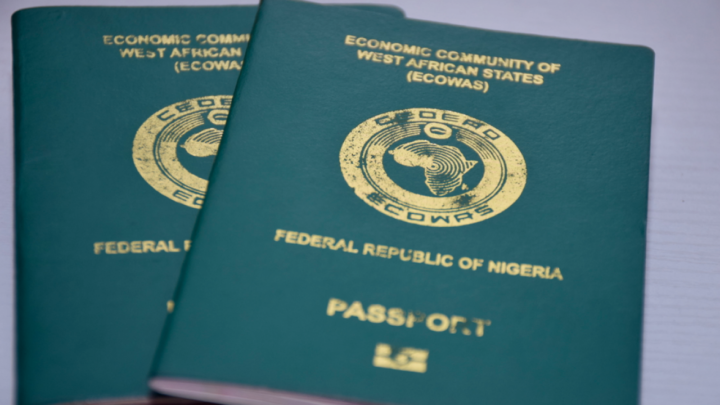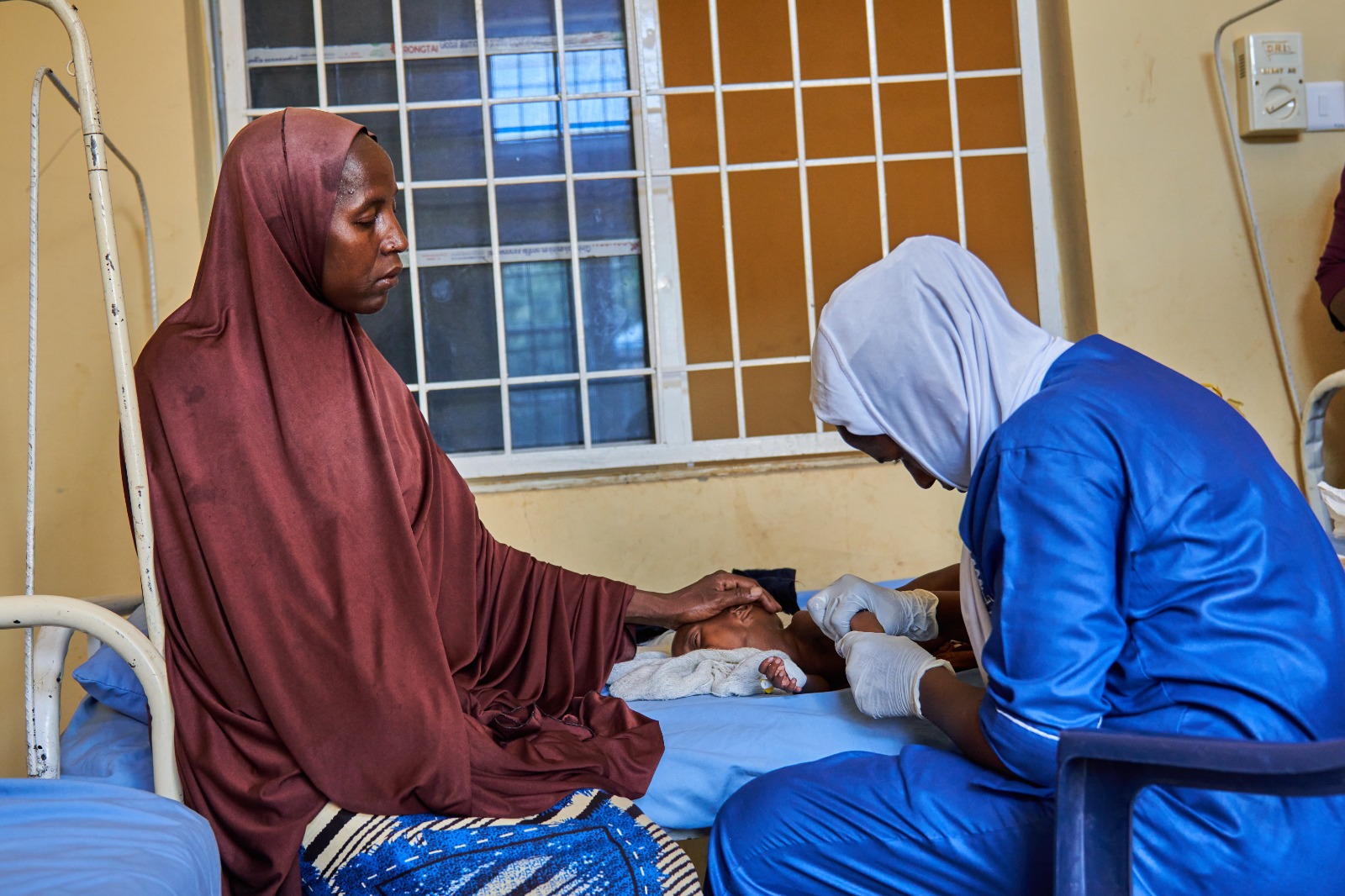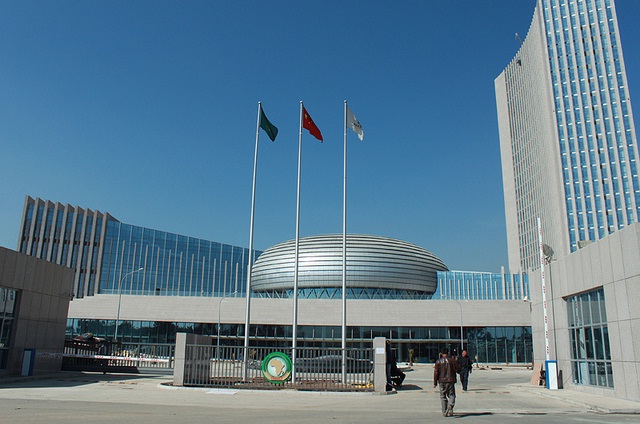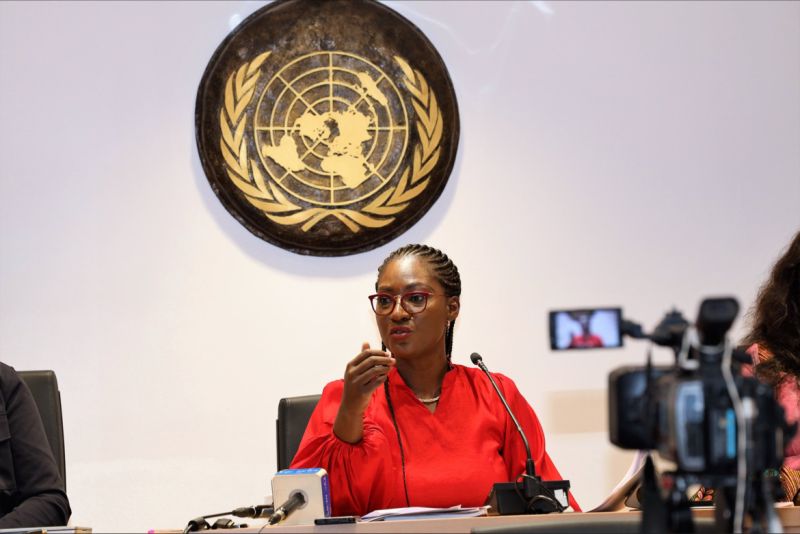Halima Iliya and her 3-year- old sick daughter
While children in tattered clothes were laid on the naked floor, their mothers and caregivers busied themselves with the only work that fills their bowels – picking and sieving of grains mixed with sand.
They seemed cheerful from a distance as their chit-chats and laughter could be heard from the entrance gate. From their voices, one could mistake them for wedding guests unless they were reminded of the lives they left behind in their various villages.
They chatted more and even made fun of one another, but some of the children could only stare or sleep away the pain that keeps them awake at night.
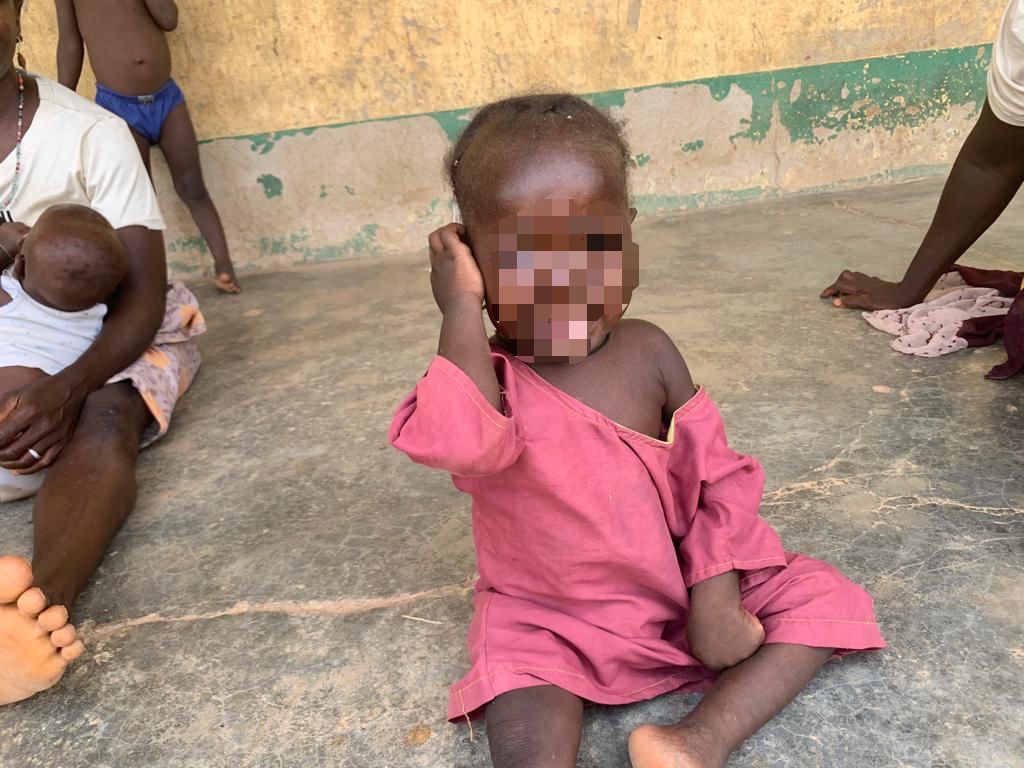
Three-year-old Saratu Shittu could feel the impact of displacement as she battled consistent coughing for more than three months.
Advertisement
The little girl, according to Halima Iliya, her mother, rarely slept at night when the cough began.
Despite the perceived severity of this illness, Saratu had only used syrup and N10 TomTom even though the condition remained the same.
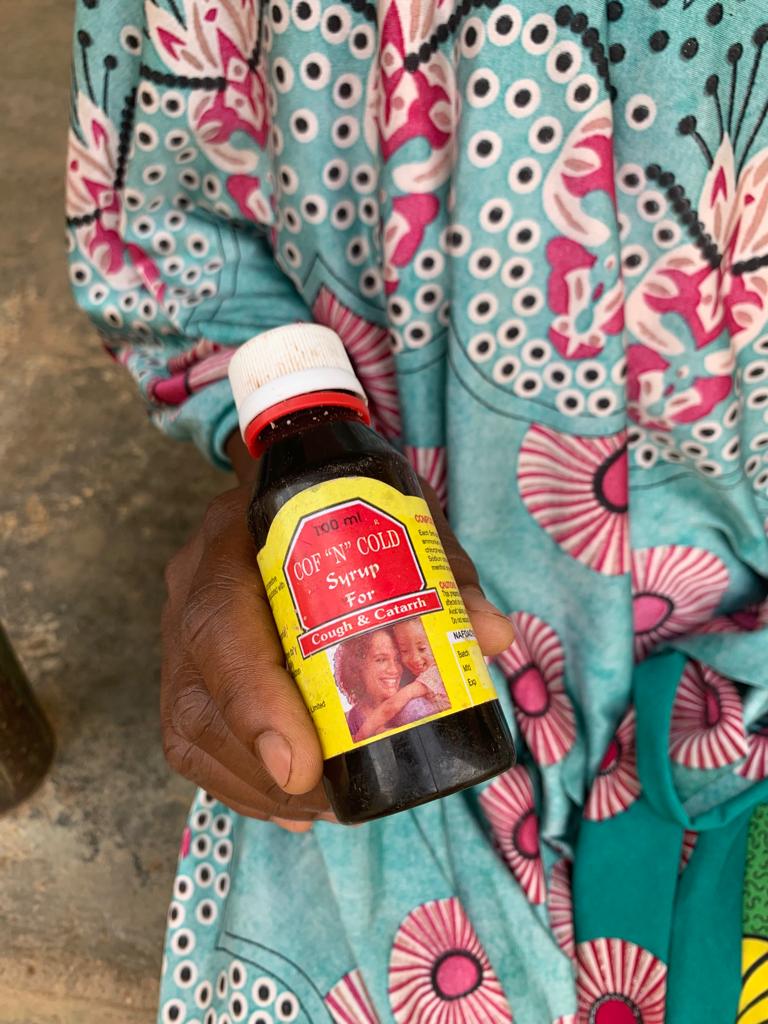
Halima wasn’t considering the hospital as the family could not afford the bills, but this strange cough quickly spread across the camp as more than seven children later exhibited similar symptoms.
Advertisement
UNDIAGNOSED COUGH SPREADING AMONG CHILDREN
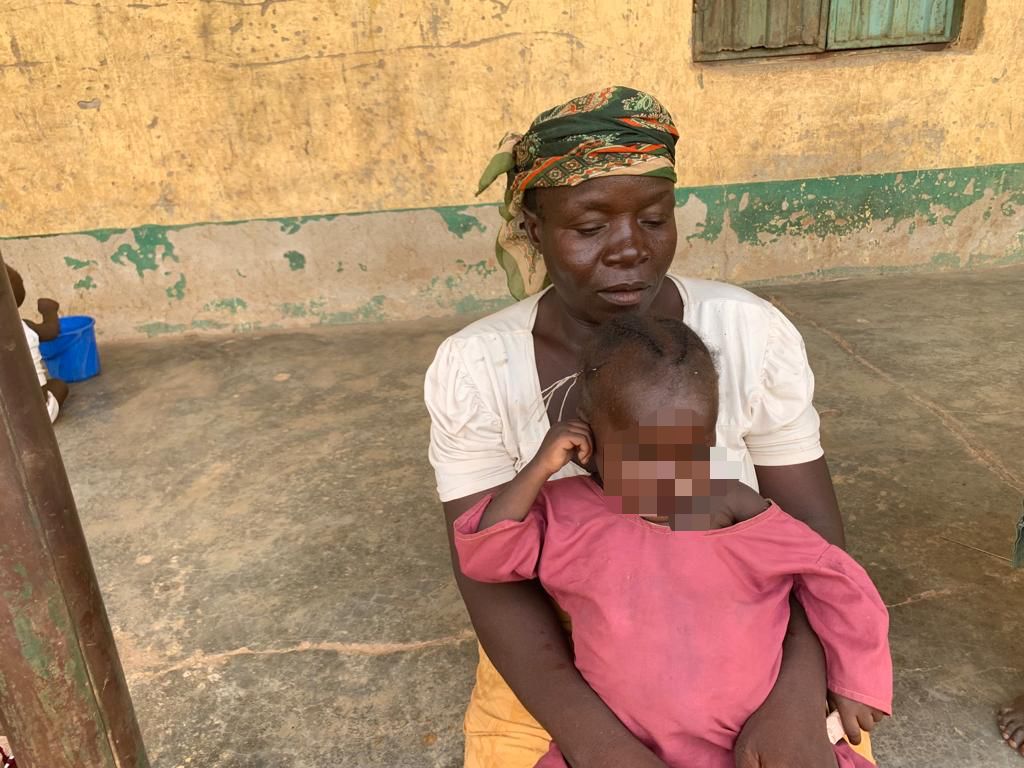
“It started some three months ago, I don’t know why the cough has refused to go,” Halima said, staring pitifully at her daughter.
Halima said she had done everything within her power (except going to the hospital) to cure the cough but nothing seemed to be working. She tried herbs but the cough persisted.
Once, some people told her to fetch the stream water in her village and use it to treat her child. She told her husband who brought the water when he travelled to Zongoro – one of the villages in Shiroro LGA of Niger state destroyed by criminal bandits.
Advertisement
“There has been no improvement since she started drinking the water. We also don’t have food and can’t afford the hospital; we have been praying and we have also used herbs. Although the camp officials sometimes buy drugs for us when we take our sick children or ourselves to them for help,” she said.
“You see them (pointing at five more children) during the day, the cough unwinds a bit but when it starts at night, they are usually unable to sleep and even throw up while coughing. The camp officials bought the syrup for my daughter. They usually buy drugs with their money.
“I can’t go to the hospital. What will happen after seeing the doctor and he prescribes drugs? I don’t have any money to purchase drugs.”
MATERNAL AND CHILD MORTALITY RISK
Advertisement
Maryam Ibrahim, 52, is a traditional birth attendant at the IDP camp in Kuta. She has been taking delivery of babies since she arrived at the IDP camp about five years ago.
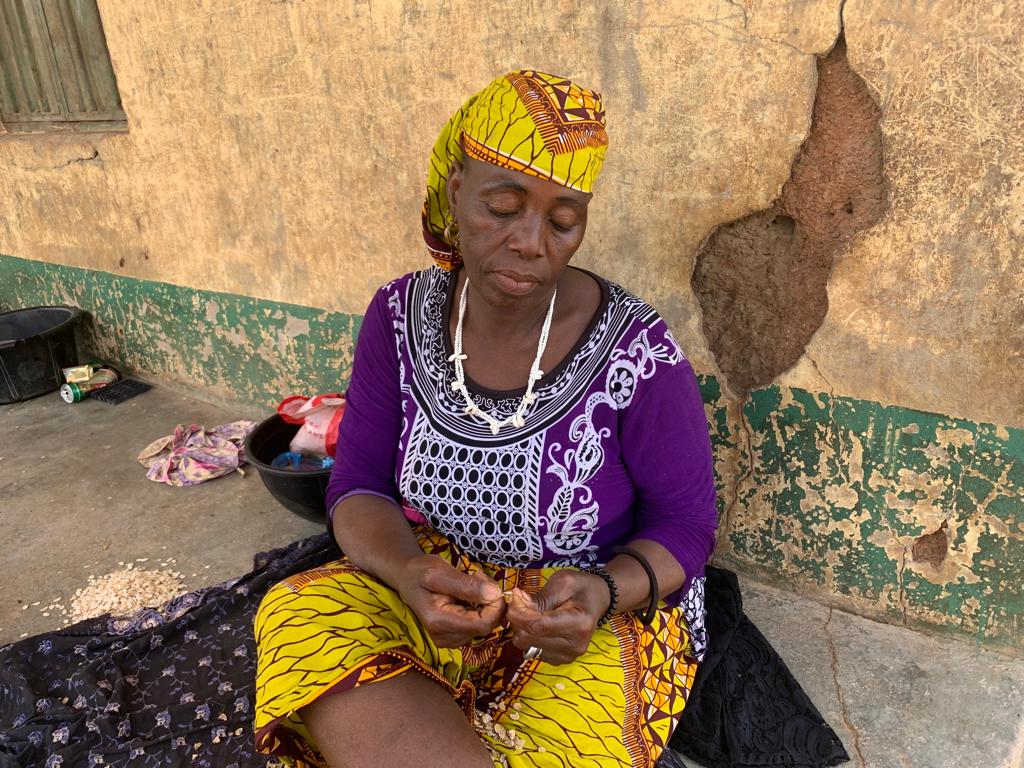
Maryam never attended a formal school. She only became a birth attendant after she was made the women leader in the camp. Since she was responsible for all the displaced women, she started to work as a birth attendant.
Advertisement
According to her, she has had more than seven deliveries in the camp, adding that only one of the women lost her baby in the process after suffering “severe” loss of blood. But she survived.
“The woman endured labour for over nine hours. She eventually delivered the baby dead and lost a lot of blood. We had to take her to the hospital after we prayed and also gave her some herbs (extracted from leaves) but the blood flow persisted,” Maryam said.
Advertisement
TheCable understands most women only visit the hospital after other alternative healing methods fail. This is usually after a long time resort to self-imposed treatments considered cheaper and still allowing them to have food on their tables — a profound necessity to them.
CHOLERA THRIVING IN IDP CAMP
Advertisement
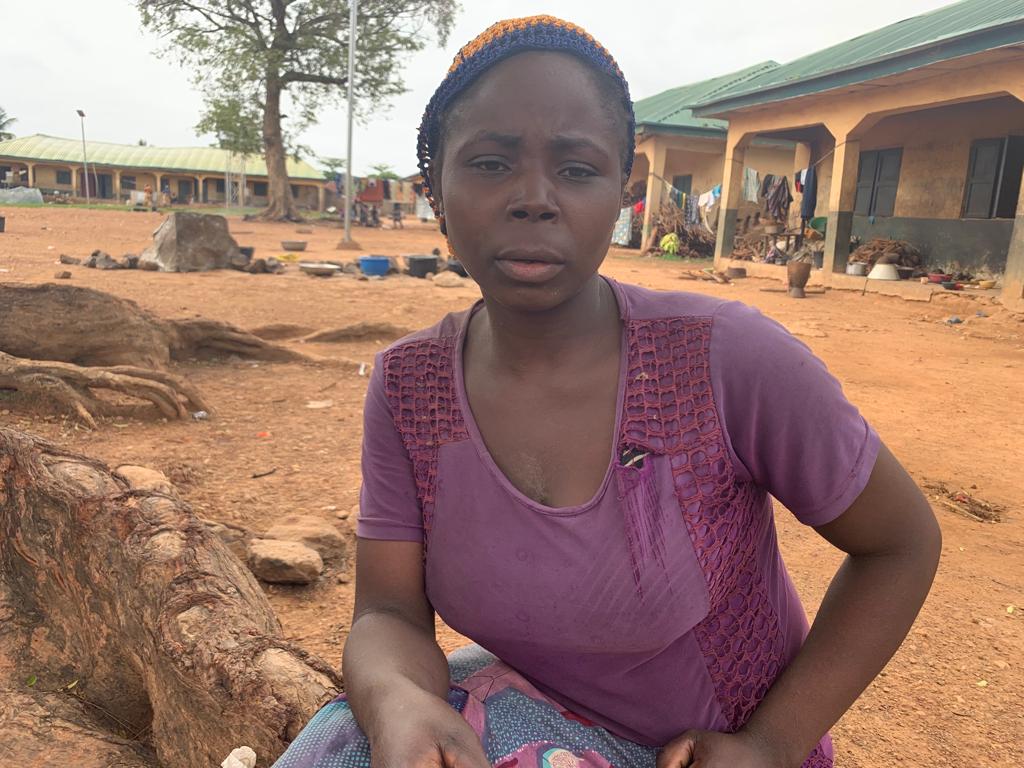
While fleeing from bandits’ attack in Kaure, a village in Shiroro LGA of Niger state, Victoria Samaila remembered to pick up some dried leaves and tree branches cut into small pieces.
These branches and leaves were used for the treatment of diseases. Victoria, who is just 24, had given birth to five children but currently mourning two daughters.
In 2021, Victoria’s daughter, Sarah, left Kaduna where she was studying to visit her parents in Gwada, a town in Niger state. Sarah’s parents had relocated to Gwada IDP camp after bandits wrecked their village.
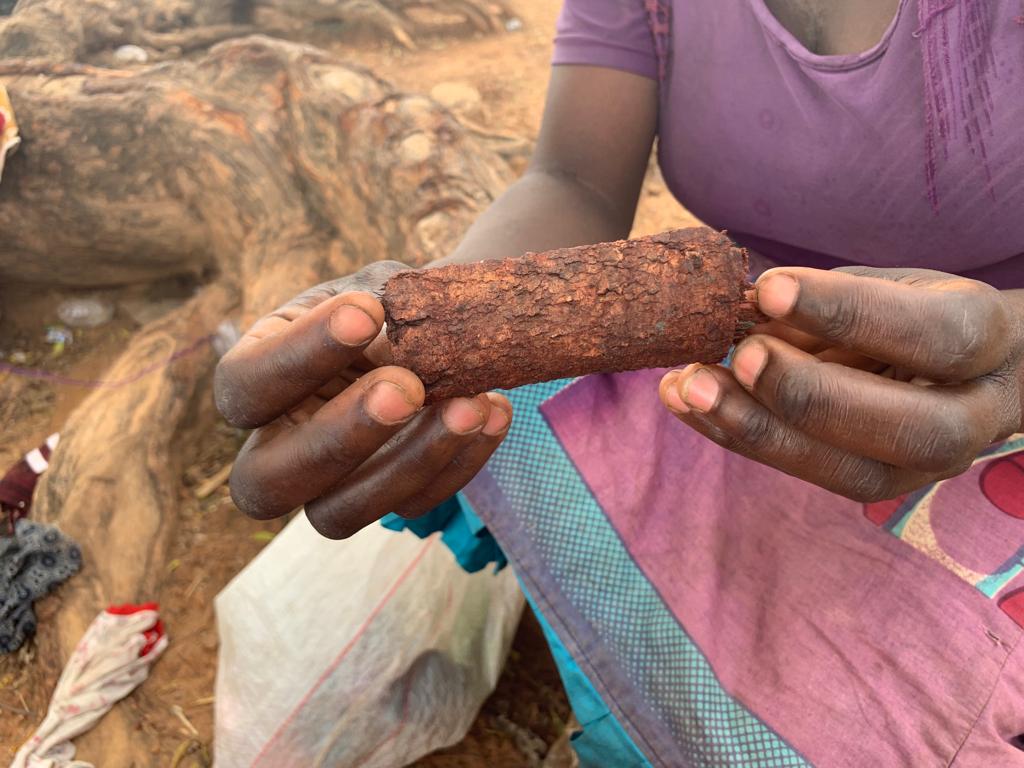
It was two weeks later when what seemed like diarrhoea spread across the camp. Sarah did not escape the disaster as she soon fell ill — an illness that got aggravated after days of drinking herbal concoctions. According to Victoria, the 9-year-old girl suffered from diarrhoea and dysentery including fever.
“It is the same medicine I use to fight some conditions, especially malaria, so I gave it to her hoping it would have the same impact. The sickness started to get worse as days passed by. We later took her to the hospital but the worse still happened,” Victoria said.
“I can’t remember the name of the leaves but I have been using it since I was in the village. I pluck the leaves from the bush when I go to work for people on their farms.
“My daughter suffered extremely. We took her to the primary healthcare centre in Gwada, close to the junction but were asked to pay money to administer treatment.
“My husband told me everything we needed was about N3,000 but we did not have the money. He was able to come up with half the amount after he went to a number of friends who lent him the money.
“The doctors said she was supposed to be given two drips of artificial hydration and nutrition but received only one because we could not afford another one. She started feeling better and we took her home but suddenly the illness returned and took my daughter away forever.”
While Victoria was mourning Sarah, she was nursing another cholera-stricken daughter. Her three-year-old baby contracted the disease and joined her sister when she couldn’t withstand the deficient treatment.
HOW LACK OF HEALTH SERVICES PUT IDPS AT RISK DURING EMERGENCIES
Victoria has not had many happy moments since she escaped the bandits’ attack on her village and moved to the IDP camp. She has lost two pregnancies owing to her inability to afford quality healthcare services.
She was pregnant when she left her village but had complications that deprived her of the baby. While at the village, the bandits invaded her house one afternoon and demanded her husband’s money.
She tried to hide the money and refused to respond to the attackers until they started to hit her on her stomach. She said the pregnancy was already over five months old.
“I started experiencing stomach pain after I fled from Kaure to the IDP camp. I told my husband and we went to the Women’s Hospital in Gwada but they said the baby had already died and I needed to undergo surgery. They also said I would be referred to a hospital in Minna (Niger state capital) but we returned home because we didn’t have money,” she said.
“My husband later took me to a private hospital in Tawali area of Gwada. We were told they would perform the surgery and remove the dead baby but we were asked to pay about N30,000 or so. I started taking some herbs and the baby got flushed out.”
Some weeks after, Victoria got pregnant again but suffered consistent stomach pain for months. She went to the hospital and this time, her husband managed to gather some money and the pregnancy was flushed out.
“During the second pregnancy, the doctors told me the baby was not in my womb, they said it was growing outside and that I could die if a quick surgery was not carried out. I don’t know how my husband got the money but I was operated on and the baby was removed,” she added.
Victoria was bent on having more children after she lost her two daughters to cholera. She got pregnant again. But this time, she delivered the baby alone. According to her, it was midnight and there was nobody in the room with her, she screamed and shouted but no one showed up.
“What should I have done? My husband was not around and the other women were in their rooms. I also don’t have money for the hospital; so I just delivered the baby alone,” she added.
SELF-MEDICATION
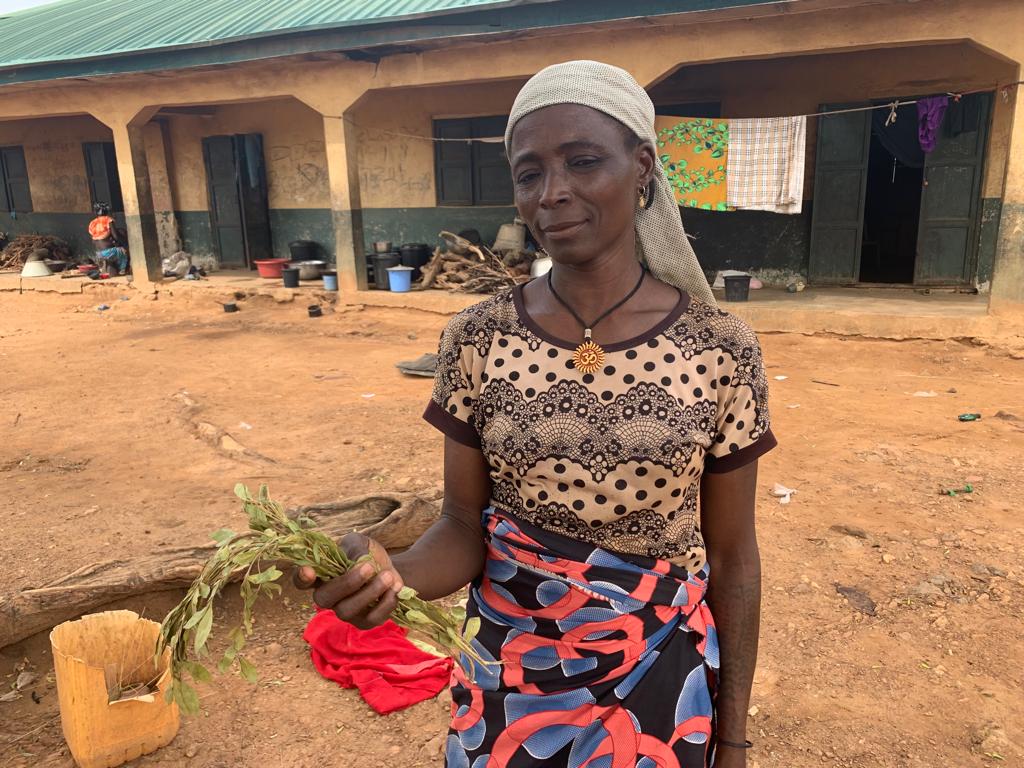
The unavailability of medical services or arrangements at the IDP camps has made more women succumb to the use of strange leaves and tree bark.
Most of these tree barks, TheCable understands, are being used by the IDPs due to certain cultural beliefs and poverty. Like Victoria, Asabe Dauda, a jovial woman in her late forties, has confidence in all the leaves she gathers. She fetches them from the bush whenever she goes to work on farms for money.
She could not tell if the leaves work or whether it was at any point proven to be effective for the treatment of the diseases she claimed it is used for. She only believes it works because she has been taking it since she was a child.
“When I came here, we suffered a lot as there was no food or any properties. Bandits have taken (sic) it all away — our food items and our houses were set ablaze. To go to the hospital is a problem, to even eat is another problem,” she said.
“Last year, my son, Samuel Dauda, got seriously sick and there was no money to go to the hospital. It was by the grace of God that he got healed.
“He complained about experiencing stomach pain but he was having a fever too. It was a combination of leaves and peels from tree branches that I fetched from the bush that cured him.”
Speaking on how the medicine is extracted, she said: “I usually boil the leave until it turns brown. I usually mix it with another leave and potassium before it is boiled.”
“After it is boiled and the water is extracted from the leaves, it can be taken for six days and there is no prescription or number of times to drink the herbs. It can be taken in any amount and any number of times the consumer desires. There is another one I use solely for headaches,” she added.
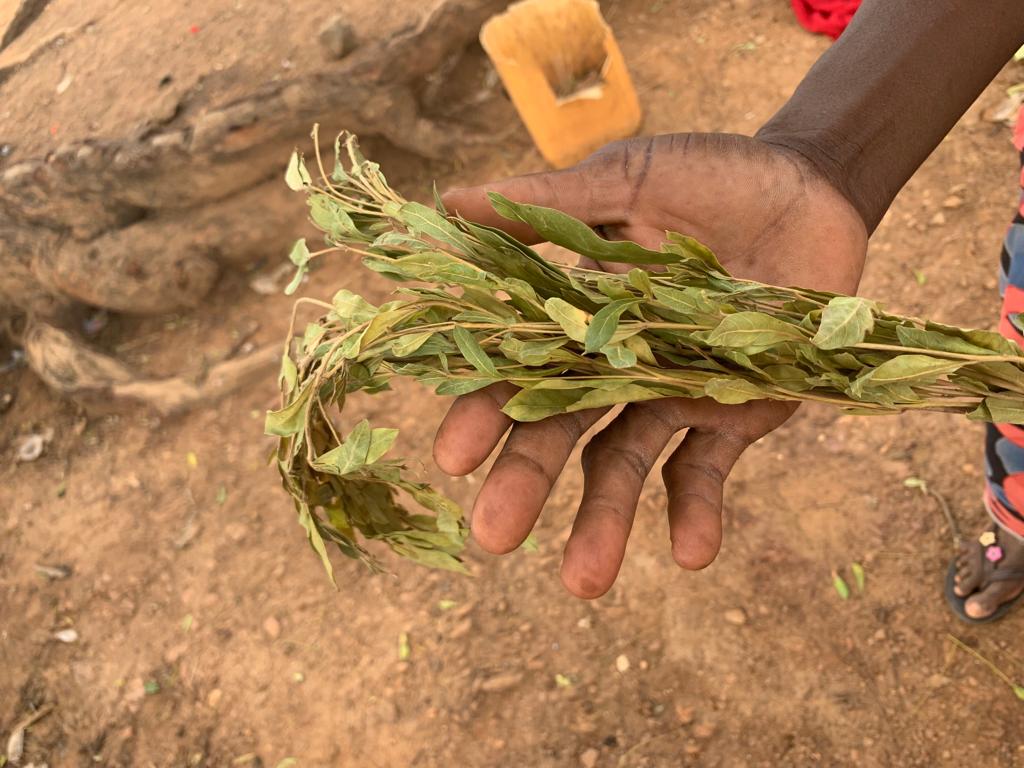
”I have used these herbs to treat malaria and other illnesses since I was growing up. How did I know about the herbs? I slept one day and I dreamt about the leaves. It was shown to me in the dream, then I went to look for it in the bush. Since then, I have been using it to treat many diseases including stomach pain, malaria, typhoid and this sickness that causes boils to pop out on the tongue.”
Asabe, who has been living in the camp since April 2020, said she used to seek medical attention whenever she fell ill in the village, adding that not going to the hospital is a habit she developed when she became displaced and could no longer afford it.
THE UNEDUCATED PHARMACIST
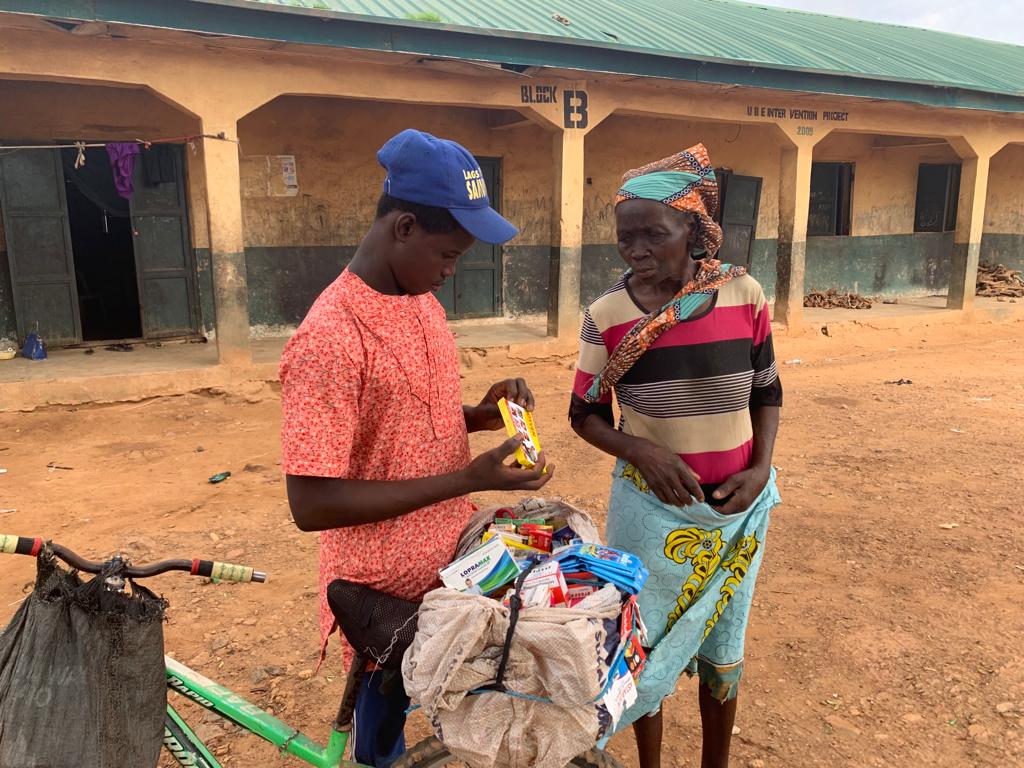
It was near evening and the sun was already retreating into the cloud when Ibrahim Aliyu, a “pharmacist by heritage”, walked into the camp pushing his bicycle loaded with a sack of drugs.
Aliyu, who is an indigene of Sokoto state, grew up helping his father make a living through a similar occupation in Gwada town. According to him, he learnt everything he knew about drugs and usage from his father who had no formal education.
“I feel like they need drugs. So, I usually bring it to them here, mostly pain relievers. I sell to them at a very low price. I have been in this business for over two years. I was born here in Gwada but I am an indigene of Sokoto state. I have been doing this business together with my father while I was growing up. He taught me everything I needed to know about the business,” he said.
“Yes, I went to school but I dropped out in JSS 2. I know the business very well. I usually check to ensure the drugs have not expired before I purchase them.”
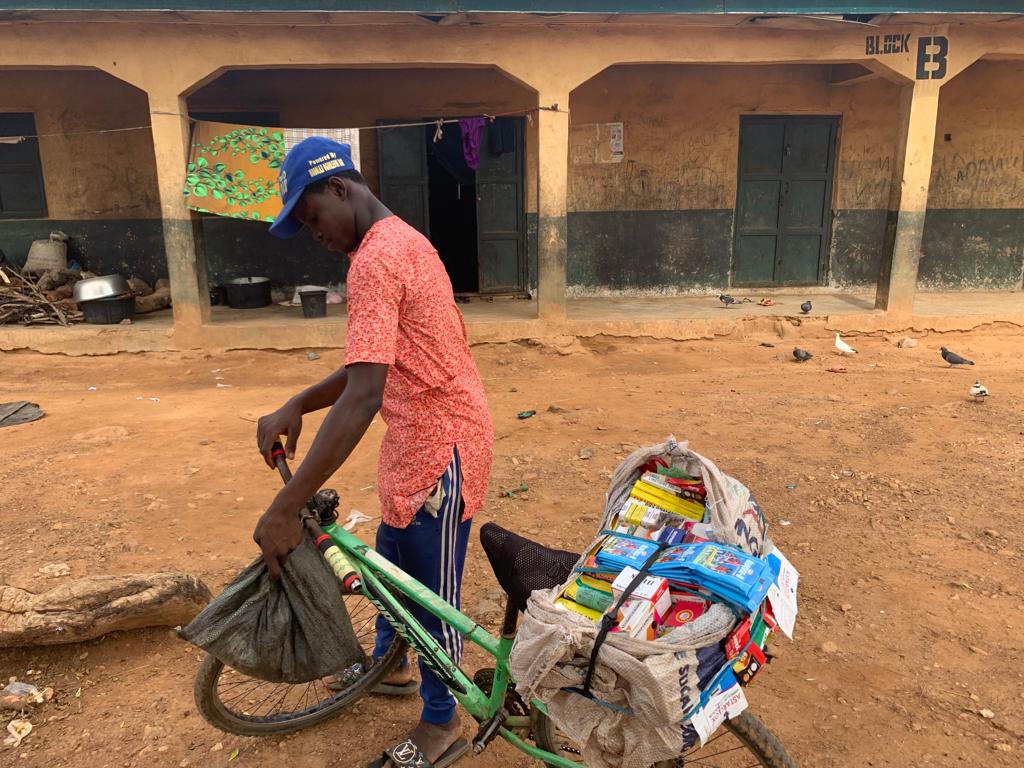
He makes a profit of N2,500 to N3,000 when he sells at the camp sometimes. According to him, he prescribes Oral Rehydration Solution (ORS) for stomach pain. The medication is used for the treatment of dehydration, to replenish the body fluids and moderate dehydration caused by diarrhoea, vomiting or other condition.
Even though there are different causes of stomach pain, Ibrahim said he usually gives ORS as an alternative when other medicines are not available.
As soon as Ibrahim arrived at the camp, the women rushed to him and started complaining about different conditions.
This report was supported by the Wole Soyinka Center for Investigative Journalism (WSCIJ) under its Report Women! Female Reporters Leadership Programme (FRLP), champion building edition.
